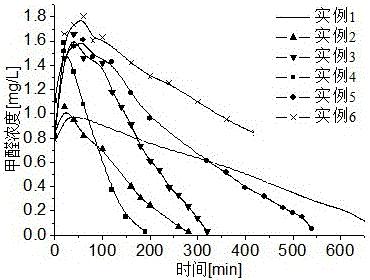A Tungsten Trioxide Composite Titanium Dioxide Photocatalyst for Degrading Formaldehyde
A photocatalyst and photocatalytic technology, applied in the field of photocatalysis, can solve problems such as difficult to realize industrial production, complex process flow, and low efficiency of photogenerated carriers
Active Publication Date: 2016-08-10
CHANGSHA UNIVERSITY OF SCIENCE AND TECHNOLOGY
View PDF0 Cites 1 Cited by
- Summary
- Abstract
- Description
- Claims
- Application Information
AI Technical Summary
Problems solved by technology
(1) TiO 2 The band gap is wide, which is 3.2ev. It can only absorb and utilize ultraviolet light with a wavelength of less than 380nm, which accounts for only 3% to 5% of sunlight, and the utilization rate of light is low;
(2) Nano-TiO 2 The photogenerated electrons and holes of the semiconductor are easy to recombine, resulting in TiO 2 The photogenerated carrier efficiency is low;
(3) Nanoscale TiO 2 Photocatalyst powder is used in air purifiers, which is inconvenient to disassemble and recycle
However, the raw materials are various, the technological process is complicated, and the preparation cost is high.
Patent Documents: 201010240649 and 200910303193 use tetrabutyl titanate as titanium source and prepare nano-TiO by sol-gel method 2 , the reaction conditions are complicated, which increases the difficulty of the preparation process and makes it difficult to realize industrial production
Method used
the structure of the environmentally friendly knitted fabric provided by the present invention; figure 2 Flow chart of the yarn wrapping machine for environmentally friendly knitted fabrics and storage devices; image 3 Is the parameter map of the yarn covering machine
View moreImage
Smart Image Click on the blue labels to locate them in the text.
Smart ImageViewing Examples
Examples
Experimental program
Comparison scheme
Effect test
Embodiment Construction
the structure of the environmentally friendly knitted fabric provided by the present invention; figure 2 Flow chart of the yarn wrapping machine for environmentally friendly knitted fabrics and storage devices; image 3 Is the parameter map of the yarn covering machine
Login to View More PUM
| Property | Measurement | Unit |
|---|---|---|
| band gap | aaaaa | aaaaa |
Login to View More
Abstract
The present invention relates to the preparation of a kind of composite photocatalyst, more particularly relate to loading P25 type nano-TiO on the nickel foam of large specific surface area 2 Composite WO 3 Photocatalyst with good catalytic degradation effect. The preparation method includes: dissolving ammonium tungstate in hot ammonia water, wet grinding with P25, impregnating and loading it on foamed nickel, drying at 100°C and then calcining at 500°C for 1 hour to obtain foamed nickel-supported WO 3 / P25 photocatalytic material. The preparation method of the invention is simple; no expensive equipment is needed; the raw material price is low; the mechanical performance is good; the photocatalytic degradation rate of the prepared catalyst is greatly improved compared with P25; it can be applied to harmful gases such as formaldehyde indoors and in automobiles The degradation of the powder photocatalyst can avoid problems such as recovery and regeneration difficulties after use.
Description
technical field The invention belongs to the field of photocatalysis, in particular to the use of foamed nickel as a supporting substrate, WO 3 The preparation method of composite P25 photocatalytic material, and the degradation ability to formaldehyde. Background technique Photocatalytic oxidation has become the most promising air purification technology due to its simple technical operation, mild conditions, low energy consumption, and no secondary pollution. 2 Semiconductors have become a research hotspot among many photocatalysts due to their good chemical stability, corrosion resistance, high activity, low cost, non-toxicity, and no secondary pollution. But TiO 2 The band gap is wide and can only absorb a small amount of ultraviolet light; at the same time, the photon efficiency is low, and it is not easy to recycle. Thus its application prospects are limited. In general, nano-TiO 2 The application of semiconductor photocatalytic degradation of organic pollutants ...
Claims
the structure of the environmentally friendly knitted fabric provided by the present invention; figure 2 Flow chart of the yarn wrapping machine for environmentally friendly knitted fabrics and storage devices; image 3 Is the parameter map of the yarn covering machine
Login to View More Application Information
Patent Timeline
 Login to View More
Login to View More Patent Type & Authority Patents(China)
IPC IPC(8): B01J23/888B01J35/00
Inventor 童海霞陶锡璨张雄飞
Owner CHANGSHA UNIVERSITY OF SCIENCE AND TECHNOLOGY
Features
- R&D
- Intellectual Property
- Life Sciences
- Materials
- Tech Scout
Why Patsnap Eureka
- Unparalleled Data Quality
- Higher Quality Content
- 60% Fewer Hallucinations
Social media
Patsnap Eureka Blog
Learn More Browse by: Latest US Patents, China's latest patents, Technical Efficacy Thesaurus, Application Domain, Technology Topic, Popular Technical Reports.
© 2025 PatSnap. All rights reserved.Legal|Privacy policy|Modern Slavery Act Transparency Statement|Sitemap|About US| Contact US: help@patsnap.com



